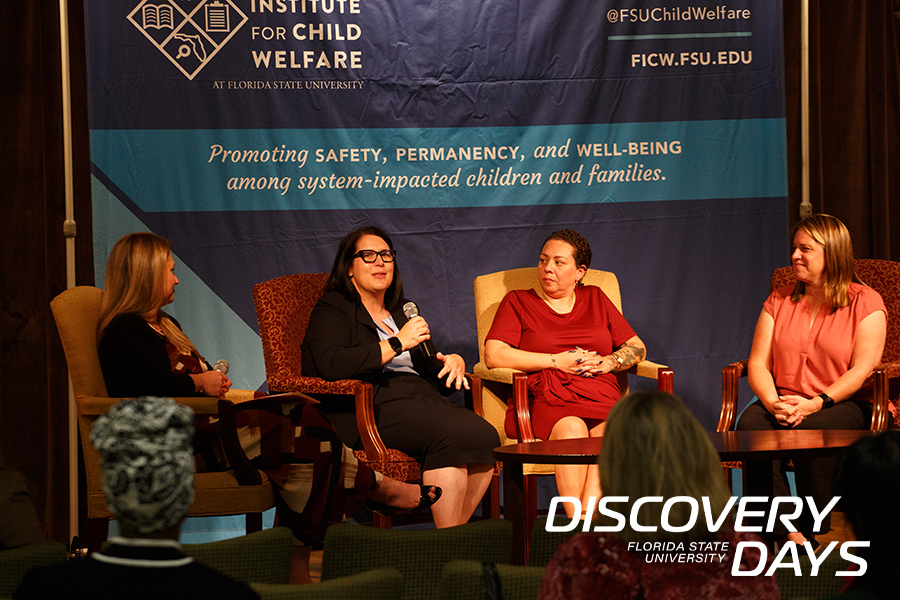
Florida State University welcomed representatives from the College of Social Work's Florida Institute for Child Welfare (FICW) for a panel during the third annual FSU Discovery Days, which explored how virtual reality (VR) technologies are revitalizing the efficiency of child welfare services.
In a workforce where skills in sensitivity are critical and emotional stakes are high, the panelists discussed how virtual reality simulations can equip trainees in child welfare with the necessary preparedness to navigate real-life scenarios before entering the field.
"Our flagship study, the Florida Study of Professionals for Safe Families, found that 81% of newly hired child welfare workers leave within about the first three and a half years of starting their role, and that's a staggering number and tells us that we need to do more, and better and ideally faster," said Lisa Magruder, director of FICW. "One way we're doing that is through our new experiential learning lab, which is coming soon. We want to bring our vision of simulation-based learning to life. We want to do more around realistic job previews. We want students and workers to have a safe place to practice, reflect, and grow before they're in the field on their own, working with families."
"We want students and workers to have a safe place to practice, reflect, and grow before they're in the field on their own, working with families."
– Lisa Magruder, director of the Florida Institute for Child Welfare
Established in 2014, the Florida Institute for Child Welfare is a legislatively mandated institute with the mission of promoting the well-being, safety and permanency of the children and families of Florida that are involved with the child welfare system. FICW conducts nationally recognized research and seeks to use collaborative partnerships, research, policy analysis and training to enhance the sustainability of the child welfare workforce.
Brooke Bass, assistant secretary for the Office of Child and Family Well-Being at the Florida Department of Children and Families, gave opening remarks at the event and highlighted how collaboration with the institute has transformed the state of child welfare services in Florida.
"Together, through research, collaboration and innovation, we've made tremendous progress in preparing and supporting the dedicated professionals who serve Florida's children and families," Bass said. "The Florida Institute for Child Welfare is not just a partner; they are a trusted ally in our shared mission."
Magruder, who took over as director of the institute in 2023, joined Kristina Finch, associate director of professional development at FICW; Morgan Cooley, assistant professor at Florida Atlantic University's Sandler School of Social Work; and Kristen Puckett, learning and development manager at the Florida Department of Children and Families' Office of Child and Family Well-Being for the panel.
Discussing the need to strengthen statewide training and ensure consistent approaches to child welfare, the panelists emphasized the potential of advancing human services alongside technology.
"How can we create infrastructure that makes this training stable?" Cooley said.
Using VR simulations tailored towards child welfare services, FICW and DCF have created the infrastructure to foster consistent, culturally sensitive and trauma-informed training, providing a safe space for staff to practice their interactions with families involved in the child welfare system.
"My motto is words matter," Puckett said. "When you can work with families in a way that makes you feel like you've done your best and where they understand what's happening, it's much easier to navigate this field."
The work done at FICW reflects the power of technology to stimulate innovation across disciplines.
"Innovation moves fast, especially now," said Finch, who helped spearhead the implementation of VR in Florida's child welfare services. "If we don't embrace technology, we're going to be left behind."
As a result of this innovation, FICW has deployed 200 headsets and launched two virtual reality simulations throughout the state, making Florida the first to implement statewide VR technology in child welfare training. With plans to expand to four scenarios by the spring, the institute has also begun merging these technologies with course curricula for students of social work.
"Students want to know when they can come back for more," Magruder said.
Yet, the panelists added that innovation is not always about developments in technology - mindset also makes the difference. While digital advancements open the doors to increased efficiency, the changes that come from engagement with technology are what truly measure innovation.
"Virtual reality is just the tool," Finch said.






